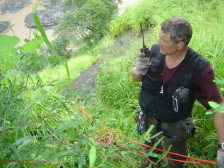Heat Can Kill – Heat Injuries
In what could be a very hot summer in the UK we should focus on what has been identified in a number of occasions as
Lack of Judgment in many heat injury and heat stroke
cases our experts have been involved in.
In the
military, where one of our investigative experts comes from, there have been years when over 100 soldiers a year have been admitted to hospital suffering from heat related illness. This ranged from just requiring fluids, tennis plays occasionally need this on the professional circuit, to fatalities.Human tolerance to heat stress varies widely and is affected by factors such as obesity, lack of fitness and sleep, recent alcohol intake, mild illness such a diarrhoea, cold or fever, dehydration or illegal drug use, some prescription drugs also, so checking with one’s doctor is strongly advised.
Heat illness has been recognised in the military since the late nighties and new guidelines in way of a published Defence Council Instruction (JS DCI) has ensured that prevention which is a command responsibility has identified errors of judgment by commanders in the past and was a frequent contributor. Research in the USA has shown the Army recruits whose 1.5 mile run times were greater than 12 minutes were three times more likely to become heat casualties than those whose run time was less than ten minutes.
People at risk come from many different activities and it embraces both heat exhaustion and heat stroke, which can trigger a potential dangerous rise in core body temperature; sunburn is also identified as a cause of performance-degrading heat illness. One form of heat illness is less identifiable, but all leaders should keep this in mind: the military are particularly at risk and easy to identify being a body that has an investigation team (LAIT) at short notice to respond to incidents and learn valuable lessons immediately. Other organisations operating in hot, humid hostile environments are not so operational ready or so organised.
Hydration and mineral intake are very important and there is a balance to strike where salts are not necessarily retained when high intake of water is taken and then sweated out again. Some leaders are not aware of this and experience shows that the sudden on-set of a medical emergency in similar circumstances can take even the most experience and best prepared leader by surprise; always consider hypothermia.
There are inherent risks when trekking abroad in humid areas especially and this must be accepted by participants as pointed out by the BS 8848. When a tragic and unfortunate incident happens a leader can only perform first aid to his/her best ability within their medical training (this training is very varied in the UK Wilderness Medical Training) and with the resources available to them at the time, and then evacuate the casualty to hospital as quickly as possible.
Our former military consultant as a former Army Physical Training officer (RAPTC) and military accident investigator (TAIT) was involved with many incidents of heat related injuries as a result of arduous training. As a consequence of a spate of heat related injuries that occurred in the 1990s studies and workshops within the military were set up to medically explore and understand why these were occurring.
The conclusion was that quite simply and especially in less extreme cases it was just that some individuals could not regulate their body temperature through their Hypothalamus (a group of neurons at the base of the brain). However, there were preventative measures, which are now well documented and these should be strongly enforced.
These preventative measures have been widely distributed and used extensively by our consultants on many occasions for others and themselves in hot hostile environments. They are in themselves simple methods and in most cases they tend to prevent overheating and allow casualties to recover and/or reach hospital in good time to aid recovery. Lack of Judgment! Don’t go there!
If you have any questions regarding heat illness or if you are involved in an heat injury or heat stroke case, please do not hesitate to contact our Expert Witnesses on 0117 986 2194 or at enquiries@iew.org.uk.
Back to News
